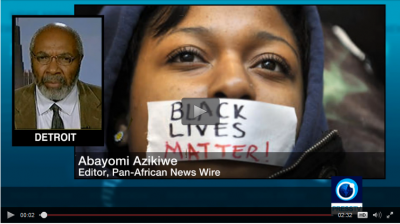Bill Clinton’s Crime Bill Led to Spike in Black Incarcerations

The US crime bill that former President Bill Clinton approved while in office led to a surge in the imprisonment of black people during the 1990s and subsequent years, an African American journalist in Detroit says.
“The Clinton administration signed the ominous crime bill during the mid-1990s which was very instrumental in the incarceration and judicial supervision of hundreds of thousands of African Americans,” said Abayomi Azikiwe, editor at the Pan-African News Wire.
“Also, there was the signing of the Effective Death Penalty Act under the Clinton administration which limited the ability of death row inmates to appeal their cases,” Azikiwe said in a phone interview with Press TV on Friday.
“We have to look at the demographics of who’s actually on death row, who is actually in prisons and African Americans are disproportionally on death row as well as incarcerated in US correctional facilities throughout the country,” he added.
On Thursday, Bill Clinton confronted protesters angry at the impact his 1994 crime reforms have had on blacks and defended the record of his wife, Hillary Clinton, who is relying on the support of black voters in her quest for the presidency.
The former president spent more than 10 minutes facing down the protesters at a campaign rally in Philadelphia, Pennsylvania, over criticisms that the crime bill he approved while president led to a surge in the imprisonment of black people.
The Violent Crime Control and Law Enforcement Act of 1994 is the largest crime bill in the history of the United States.
The bill consists of 356 pages providing for 100,000 new police officers, $9.7 billion in funding for prisons and $6.1 billion in funding for prevention programs. The bill was originally written by then-US Senator Joe Biden, passed by Congress and signed into law by Bill Clinton.
Video footage of Hillary Clinton defending the reforms in 1994 has been widely circulated during her presidential campaign by activists in the Black Lives Matter protest movement.
In the footage, she calls young people in gangs “super-predators” who need to “be brought to heel.” Hillary Clinton, 68, who also has faced protesters upset by her remarks, said in February she regretted her language.
Bill Clinton, 69, who was president from 1993 to 2001, defended her 1994 remarks, which protesters say were racially insensitive, and suggested the protesters’ anger was misplaced.
Bill Clinton’s remarks on Thursday drew criticism online as well. Some saw him as dismissive of the Black Lives Matter movement, a national campaign that protests the deaths of black people by police officers.
To listen to this statement by Abayomi Azikiwe just click here

